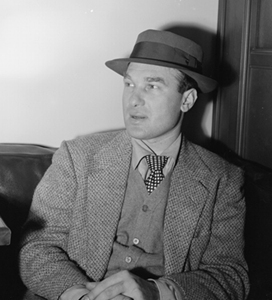
In my earlier post about Granz I focused on two movies he helped to produce: Improvisation and Jammin' the Blues (which is also included in the 2-DVD Improvisation set.)
Since that post I have been digging deeper into Granz' accomplishments and have come away in awe.
If he never produced a single movie he would have still left behind a body of recorded work that, in my opinion, is a national treasure. Music aside, what made him an angel in disguise were his moral and physical courage when it came to fighting segregation, his willingness to record artists because of their art when it made no business sense to do so, and his staunch insistence on paying equal wages (above the standard for the day, by the way) for white and black artists.
If you are young you may not understand my statement regarding physical courage. Back in the 1940s and 1950s Granz refused to play to segregated audiences or at venues that denied artists full use of facilities based on skin color. During those times that was a dangerous stance. It's one thing to publicly espouse those views from a remote office, and quite another to hold one's ground in a face-to-face confrontation in the US South. Granz did that at a time when lynchings were still too common, and such an act required the utmost in moral and physical courage. The following story, from this source, speaks volumes:
Oscar Peterson recounted how Granz once continued to insist that white cabdrivers take his black artists as customers even while a policeman was pointing a loaded pistol at his stomach from close range (Granz won).
Ella Fitzgerald was among the artists who Granz rescued from fading into obscurity and irrelevance, while countless other artists were given career boosts through Granz' Jazz at the Philharmonic (JATP) tours, and his unyielding insistence that they be recorded when conventional business wisdom would have dictated otherwise.
The best way to know and understand Granz is via this BBC Radio 2 program that was broadcast in eighteen segments starting in December 2003. Here is the opening show:
The entire series, comprising nearly three hours, can be watched on this Youtube playlist
Augmenting this material is a two piece Les Tomkins interview with Granz conducted between 1966 and 1967: Part I, and the concluding Part II.
I have compiled some of the more famous works produced by Granz in this list, however, two that truly showcase his contributions are The Complete Norman Granz Jam Sessions, and a box set titled The Complete Jazz At The Philharmonic On Verve: 1944-1949. Both sets document some of the most important live sessions recorded in jazz history. Interestingly, most of the performances on the Classic Drummer and Legends of Jazz Drumming videos come from concerts that Granz promoted and produced.
I hope you come away with the same appreciation for this remarkable man as I have. His memory deserves to be preserved.



No comments:
Post a Comment